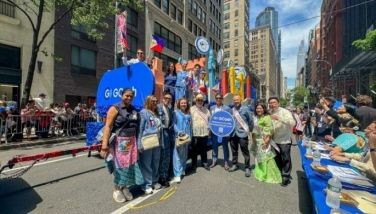Solidarity of voices

“When a reader falls in love with a book, it leaves its essence inside him, like radioactive fallout in an arable field, and after that there are certain crops that will no longer grow in him, while other, stranger, more fantastic growths may occasionally be produced.”
These are words from renowned author Salman Rushdie, who was the victim of a vicious stabbing attack on stage last Aug. 12 after living for 33 years under the threat of a fatwa calling for his death. Iran’s foreign ministry, in denying any link to the attacker, has stated that the blame should lie solely on Rushdie and his supporters as he had “exposed himself to public indignation.”
Fortunately, Mr. Rushdie survived the attack, even after receiving stab wounds to the neck and chest. The extent of any recovery, however, is still uncertain and as of this writing he remains in critical condition… hardly surprising given that he allegedly sustained damage to his liver and severed nerves in his arm and one eye.
This brutal attack can and should be condemned in the strongest terms, without reservation. It deserves this condemnation independently of what one thinks of Rushdie’s works, or what one thinks of Rushdie as an individual, either as a writer or a public figure. This was a public, violent attack on a literary writer, and as such it was both literally and symbolically an attack on free expression.
Free expression has always been a contested concept, from the suppression of criticism by ancient tyrants to the back-and-forth between accountability and witch-hunting that so characterize modern “culture wars.” Already there are those who would wrongly equate the near-fatal attack on Rushdie with so-called “cancelling” on social media and there are also those who would put on the same level demands for diversity in media with a bounty placed for the death of a human being.
Such false equivalences should be firmly and swiftly rebutted – but those who would make them should be allowed to make them and be allowed to speak. That words have power is a lesson one would hope we need not re-learn – not when this is so evident from the frequent and desperate attempts to suppress them. But the acknowledgement of this power can come with both the need for accountability as well as the need to safeguard free speech and expression.
There are types of speech that cause direct harm, and those who are marginalized and vulnerable know it best: the type of verbal abuse and harassment women so commonly face, for example, is one of the reasons why we needed the Anti-Violence Against Women and Children Act. In an age where malicious words can be hurled en masse at unwilling recipients, where willful misinformation can endanger the lives of hundreds of thousands in a pandemic, the idea that any and all speech should be allowable at all times is not one which is consistent with a desire to protect the most vulnerable of society.
Yet freedom of expression is so important, so essential – not only to hold powers accountable but for the cultural evolution that is an integral part to what makes us human – that it must always be the rule and not the exception, and any limitations placed upon it by a government must be rigorously justified and exceedingly narrow and specific in scope.
The freedom to express oneself, to speak one’s mind, is a good in and of itself. It is a good regardless of the artistic merit of the expression, regardless of the eloquence of the speech. It is a formative freedom, without which we are unable to ever learn anything, for without the freedom to speak for ourselves, we are unable to think for ourselves – unable to form our own identities. We create ourselves through our consciously chosen words and actions, we learn through consciously correcting our mistakes. Even for those of us who do not make a living from art or the written word, the freedom of speech and expression is a matter of life or death, of identity.
And so we must condemn those that would do violence to writers, to artists, to poets and journalists – not only because we condemn violence itself but also because we must condemn those that would deprive us of voices – whether these be those of geniuses or children; those that are prolific or those that write a single phrase; those that comfort us or those that disturb us. We must condemn those who would deprive us of information that provide us choices; information that would provide us enlightenment and growth; information that can save us and change our lives for the better.
More – we must resist. We must resist the chilling effect that the perpetrators desire. We must speak our own truths and provide a space for others to safely do the same, for every voice raised adds to the sum total of human culture, no matter how small that voice or how seemingly mundane its contribution. We are enriched by more voices, by diverse voices, and each voice is as unique and irreplaceable as the person to whom it belongs.
Rushdie’s voice matters. My voice matters. Your voice, dear reader, matters.
I began this column with Rushdie’s words, and so it is fitting that I end with them as well, from remarks delivered at the PEN America Emergency World Voices Congress of Writers that resonate all the more strongly now:
“A poem will not stop a bullet. A novel cannot defuse a bomb. Not all satirists are heroes. But we are not helpless. Even after Orpheus was torn to pieces, his severed head, floating down the river Hebrus, went on singing, reminding us that song is stronger than death. We can sing the truth and name the liars. We can stand in solidarity with our fellows on the front lines and magnify their voices by adding our own.”
Let us magnify. Let us add. Let us speak. Let us write.
Let us all stand in solidarity against those that would silence with violence.
- Latest
- Trending




























